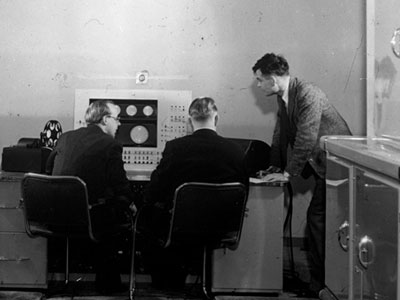After last year thousands of science enthusiasts broke the Guinness world record in the category of the largest chemistry lesson in the world, this year the multitudes of visitors to the night of the scientists will be asked to decide in a head-to-head match between man and computer.

After last year thousands of science enthusiasts broke the Guinness world record in the category of the largest chemistry lesson in the world, this year the multitudes of visitors to the night of the scientists will be asked to decide in a head-to-head match between man and computer. At the event, initiated by the Ministry of Science and Technology, the general public will for the first time be able to decide on the question - does a computer have at least as much intelligence as humans - a question that was coined by Alan Turing, the father of computer science, back in the 50s in what would later be called the "Turing Test".
The Night of the Scientists was held for the seventh year in universities and science museums throughout the country in cooperation with the Ministry of Science and Technology and the European Union and with the national concentration of the MedaTech Museum. On this evening, research and science institutions across the country open their doors to the general public free of charge and offer face-to-face meetings with scientists, laboratory tours, lectures, experiential workshops, sessions and diverse activities. This year the events will be in the context of computer science on the occasion of the 100th anniversary of the birth of Alan Turing, the father of computer science.
As part of the national event of the Turing Test initiated by the Ministry of Science and Technology, visitors to the 12 sites of the Night of Scientists across the country will participate in a short lesson on Alan Turing in which they will watch an entertainment produced by the Ministry with the participation of four characters: the science-loving model Adi Neuman, the CEO of Intel Israel Maxine Fassberg, The chairman of the Israel Space Agency in the Ministry of Science, Prof. Col. (resp.) Yitzhak Ben-Israel and a gifted boy named Yonatan Bunzel. The entertainment will be moderated by Avery Gilad who will ask the participants questions aimed at finding out which of them is pretending to have gotten their answers from the computer. Some of the questions are trivia questions and some teach about life experience and emotional intelligence - questions that the computer may have difficulty answering. If the impersonator succeeds in convincing the general audience that he is answering the answers of a person, then the computer has passed the Turing test and can be said to be as intelligent as humans.
So far, very few computer programs have passed the Turing test successfully and never completely. There are several conversation programs that have been successful in the Lobner competition for the Turing test, and everyone knows the "Deep Blue" program that beat Garry Kasparov and the "Watson" program that won the knowledge game Jeopardy.
At the Scientists' Night event, the general public will be able to be the judge in the Turing test and decide who is impersonating the computer. At the same time, surfers from home or from their smartphone will be able to vote through A special application on the Facebook page of the Ministry of Science and Technology that will be active that day:
According to the Minister of Science and Technology Prof. Daniel Hershkowitz, "In the time that has passed since Turing devised the test, computers have become more sophisticated until today there are computers that compose musical compositions, write stories, simulate almost entirely biological models and are even able to restore corrupted texts. Therefore, I assume that it will not be easy to identify in an experiment on the night of the scientists who is the person and who is the computer."
The Night of Scientists events will take place on September 24, 2012, starting at 17:00 p.m. at the following institutions: Madatech, the Science and Space Museum in Haifa; Bloomfield Science Museum in Jerusalem; Haifa University; the Technion; Galil Migal Knowledge Center in Kiryat Shmona; Weizmann Institute in Rehovot; Hebrew University of Jerusalem; Tel Aviv University; The Open University in Ra'anana; Sami Shimon College in the Ashdod and Be'er Sheva campuses; and Ben Gurion University of the Negev.
More details on the website of the Ministry of Science and Technology

One response
I noticed that it is very easy to "drop" these programs if you ask them questions that refer to details that you discussed only a few minutes ago, or only a few sentences ago. That is, they always know how to refer to or respond in a "quite convincing" way to the last sentence you wrote, but if a few minutes ago you wrote the software a sentence like:
"I live in a house with a garden and two trees in it"
And after a few sentences you will ask her a simple question that every person would immediately know how to answer like "How many trees do I have in my garden?", the software simply won't know the answer and will try to move the topic.
In other words, the simplest trick is to constantly ask and refer to previous details brought up in the conversation, and not refer only to the last sentence, today's software is simply bad at this.